How Americans view recent movements by government agencies towards citizen engagement on social media sites
The preceding analysis has been devoted to examining what Americans do online, and how they interact with government using digital tools. In this section, we examine their views towards different online government services—which ones they find most important, and how they view recent movements by government agencies towards citizen engagement on social media sites.
In order to determine the online government services with the highest level of relevance to the general public, we asked respondents to rate the importance of four different types of services that government agencies might provide online. The services we asked about include:
- Providing general information on government websites
- Allowing people to contact government officials online
- Allowing people to complete specific tasks online, such as submitting applications or renewing licenses
- Posting information and alerts on sites such as Facebook or Twitter
Providing general information, allowing for online contact and allowing users to complete specific tasks rank as approximately equal in importance. Around two-thirds of all adults (including both internet users and non-users) rate each of these offerings as “very important” and an additional one in five rate them as “somewhat important”. Among the population as a whole, posting information on sites such as Facebook or Twitter is seen as much less important. Just one in five Americans view such services as “very important” for government to provide, and one-quarter view them as “not at all important”.
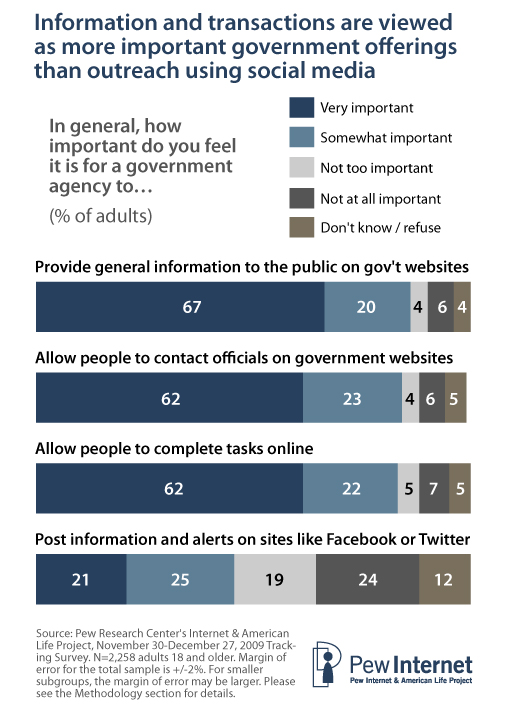
Information- and task-oriented online government services are particularly relevant to those with high levels of income and education. Compared to Americans with low levels of income and education, those with some college experience or a college degree, as well as those earning more than $50,000 per year, are much more likely to say it is “very important” for government agencies to do things such as provide general information on its website, allow people to contact agency officials online and allow people to complete general tasks on its website. These results are in line with our findings from Part 1 that the wealthy and well-educated tend to use a wider range of information- and transaction-oriented government websites than those at the lower end of the socio-economic scale.
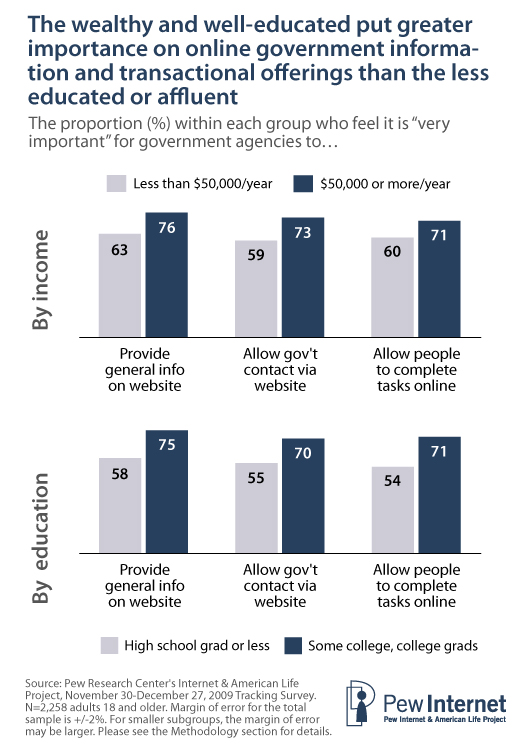
Men and women are equally likely to view these online government services as important, and there are few differences between whites, blacks and Hispanics on this question. There is some variation on this question based on age, as adults under the age of 50 tend to have much more positive views towards online government services than those ages 65 and up. Indeed, even within the online population seniors are the age group that is least likely to consider different online government services to be “very important.”
Government outreach on social media sites shows particular relevance for young adults and minority groups
As noted above, posting government information and alerts on social media sites is generally seen as less important than providing basic information and services on government websites. One in five adults (21%) feel that it is “very important” for government to do this, while an additional 25% say it is “somewhat important”. However, providing access to government information on these sites does seem to resonate with certain groups—in particular, ethnic minorities and those with low levels of income and education.
Minority and low-income voters feel that this form of government outreach is quite important compared with whites and those with higher incomes, a trend that was not apparent in our analysis of more traditional online government offerings. One-third (33%) of Latinos and 31% of African Americans feel that posting government information on social media sites is “very important”, while just 17% of whites agree. Indeed, fully one-quarter (26%) of whites feel that this type of outreach is “not at all important”, a figure that is significantly higher than that for blacks and Hispanics. In total, 60% of blacks and 53% of Hispanics feel that government outreach using social media is important, compared with 41% of whites.
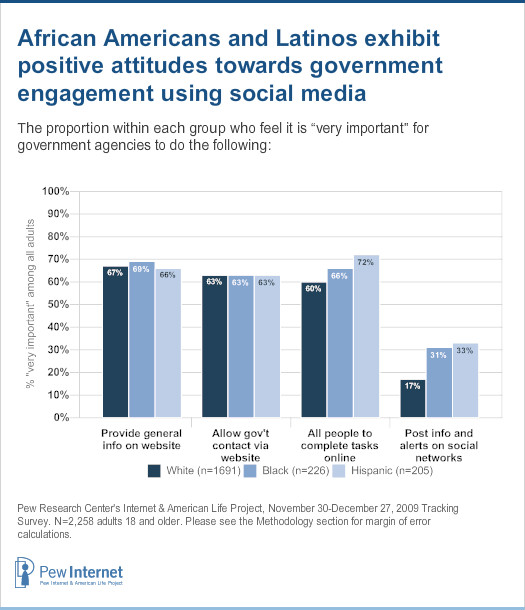
Similarly, one in three Americans without a high school degree (30%) think it is “very important” to post government information on social media sites, significantly higher than the figure for high school graduates (20%), those with some college experience (21%) or those with a college degree (18%). Again, this is quite different from what we found with more general information-oriented online government services, where the well-educated were much more likely to view these services as important.
Americans tend to view social media as a useful way to provide access to existing information
In addition to evaluating the importance of different online government offerings, we also used this survey to measure people’s opinions of government engagement using social media sites such blogs, social networking sites or text messaging. To do this, we asked our survey respondents whether they agreed or disagreed with four separate statements about government agencies and officials allowing people to get information and submit feedback using new tools such as blogs, social networking sites, services like Twitter or text messaging.
The first two statements tested positive attitudes towards government outreach using social media, and our survey participants tended to agree relatively strongly with these propositions. Three-quarters (79%) agree with the statement that having the ability to follow and communicate online with government using these tools “helps people be more informed about what the government is doing”, while 74% agree that it “makes government agencies and officials more accessible”. We asked this question of all respondents, and not surprisingly internet users tend to have more positive views of social media engagement than non-users: 78% of internet users agree that this type of engagement makes government more accessible (compared with 63% for non-users), while 82% of internet users and 68% of non-users agree that it helps people be more informed about what government is doing.
In addition to testing these positive impacts of government engagement using social media, we also asked our respondents to evaluate two less positive statements about government social media engagement—that this type of activity “is a waste of government money” and “just delivers the same government information in different ways”. Two in five Americans (41%) agree that such services are a waste of government money, although half (52%) disagree with this statement. By contrast, fully 72% of Americans feel that this type of engagement merely delivers the same government information in a new way.
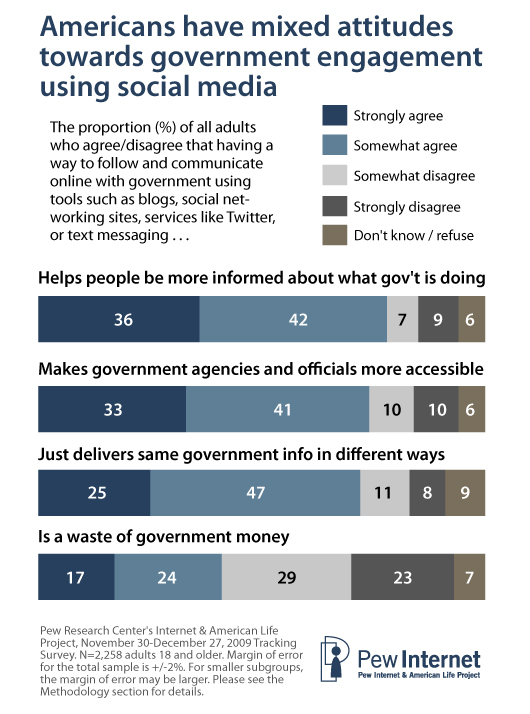
These attitudinal questions were asked of all adults, and it is instructive to look at how this type of outreach is viewed by Americans who are already using new technologies to get government information (in other words, the government social media users we discussed in Part 1). Perhaps not surprisingly, government social media users agree strongly with positive statements about this type of government engagement. Compared with those who go online but do not get government information using tools such as blogs or online social networks, government social media users are significantly more likely to agree that this type of engagement makes government agencies more accessible (46% “strongly agree” with this statement, compared with 31% of other internet users) and helps people be more informed about what the government is doing (45% vs. 33%). They are also more likely to disagree with the assertion that this type of activity is a waste of government money (33% of government social media users strongly disagree with this statement, compared with 21% of other internet users). On the other hand, having experience with these tools in a government context, these users are more likely than others to put them in the “useful but not new” category—one third (33%) of government social media users also strongly agree that these tools just deliver the same information in different ways, compared with 24% of other internet users who feel the same way.
Minorities again lead the way in their attitudes towards government engagement using social media
In addition to viewing social media as an important element of government outreach, minority respondents—African-Americans in particular—also tend to agree strongly with positive statements about government engagement using new media. Fully 41% of African-Americans strongly agree that engagement using new tools makes government more accessible, and 53% strongly agree that this type of engagement helps people be more informed about what the government is doing—both of these are significantly higher than the comparable figures for whites (30% and 32%, respectively).
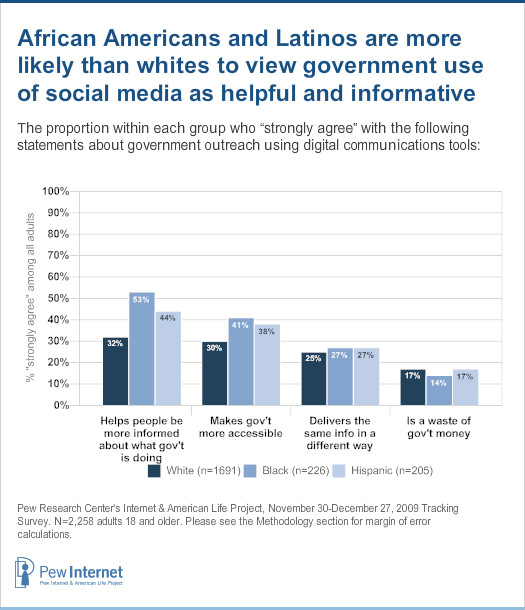
Younger adults are also relatively likely to view such engagement positively, while seniors are generally more likely to agree with the more negative statements posed to them about government engagement using social media.


